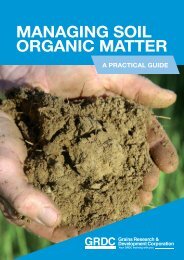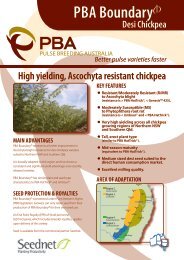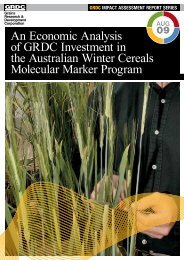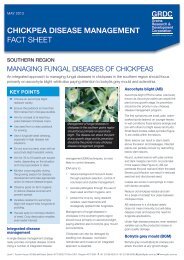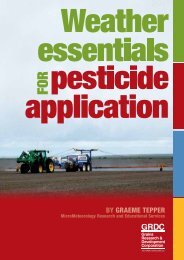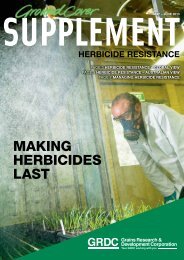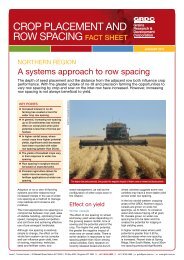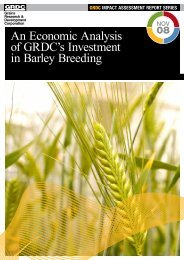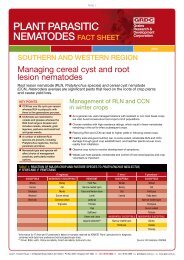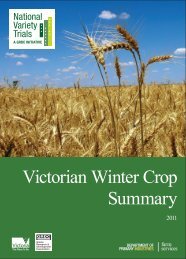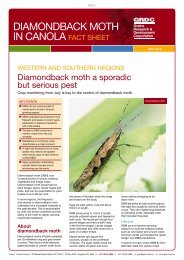grdc growers' report - Grains Research & Development Corporation
grdc growers' report - Grains Research & Development Corporation
grdc growers' report - Grains Research & Development Corporation
Create successful ePaper yourself
Turn your PDF publications into a flip-book with our unique Google optimized e-Paper software.
from the <strong>grdc</strong> regions<br />
Western<br />
Region<br />
by PETER ROBERTS,<br />
GRDC Western Panel Chair<br />
In 2011 the GRDC has put in place concrete<br />
new measures to ensure that its research<br />
priorities are increasingly grower-focussed.<br />
This heightened push for grower-centred<br />
research is being realised in Western<br />
Australia by giving growers more<br />
opportunities to participate in the GRDC’s<br />
investment priority process.<br />
New initiatives introduced—such as<br />
significantly expanded spring tours by the<br />
Western Regional Panel and the appointment<br />
of Regional Cropping Solutions (RCS)<br />
facilitators—are all about achieving a much<br />
closer relationship with growers.<br />
The GRDC Western Regional Panel aims to<br />
understand completely what the drivers are<br />
for grower profitability in different areas of<br />
WA, and bring those issues back to the<br />
GRDC. It is about making sure that a<br />
grower’s investment in the GRDC is the best<br />
they can make in terms of returns—better<br />
than shares, real estate or any other form<br />
of investment.<br />
The GRDC Western Regional Panel wants to<br />
ensure growers have a good understanding<br />
of where GRDC money goes and that<br />
growers really value the investment made by<br />
the GRDC. Ongoing investments are being<br />
made by the GRDC into priority research<br />
issues voiced by growers to the Western<br />
Regional Panel.<br />
Some of the issues covered by these<br />
continuing investments include non-wetting<br />
soils; frost management; the development<br />
of more sustainable legume systems;<br />
herbicide resistant weeds; breeding for<br />
disease resistance and drought tolerance;<br />
cereal yield; and water use efficiency.<br />
However, new investments are also being<br />
made into areas including a project to<br />
broaden the range of fungicides available<br />
to cereal and pulse growers, and new<br />
legume research in WA.<br />
More information about new areas of<br />
investment is available in the GRDC<br />
2012-13 Investment Plan (Open and<br />
Multi-stage Tenders), on the GRDC website<br />
www.<strong>grdc</strong>.com.au.<br />
All new projects outlined in the investment<br />
plan now require results to be extended to<br />
growers and other stakeholders—a result<br />
of recommendations in the new National<br />
<strong>Grains</strong> RD&E Strategy.<br />
Although a research project may be<br />
nationally targeted, delivery of the results<br />
will occur regionally and locally to growers<br />
at ground level.<br />
Expanded spring tours<br />
One of the ways in which the GRDC is<br />
increasing the opportunities for WA growers<br />
to contribute to research priorities is through<br />
a new approach to the Western Regional<br />
Panel’s annual spring tour.<br />
Australian Herbicide Resistance Initiative (AHRI) director Stephen Powles, left, inspects trials with GRDC<br />
Western Regional Panel member John Even and GRDC Western Regional Panel Chair Peter Roberts. The trials<br />
relate to a herbicide resistance survey conducted by AHRI in the WA grainbelt. Photo: GRDC<br />
Where your 2010–11 research dollars were<br />
invested in the West ($m)<br />
$50.88m TOTAL<br />
■ Cross-commodity $41.88<br />
■ Coarse grains $1.22<br />
■ Grain legumes $4.29<br />
■ Oilseeds $1.00<br />
■ Wheat $2.50<br />
Traditionally the panel has toured an area<br />
of the WA grainbelt as a whole group, but<br />
in 2011 panellists split into three smaller<br />
groups to consult with growers and<br />
industry representatives from a much<br />
bigger area.<br />
Hundreds of WA grain growers were<br />
consulted by panel members during the<br />
three week-long tours which took place in<br />
the grainbelt’s northern, central and<br />
southern regions.<br />
The aim of the significantly expanded tours<br />
is for members of the panel to visit more<br />
of the grainbelt, more often, to improve<br />
two-way communication with growers and<br />
other stakeholders. On the whole, growers<br />
we met with on the three tours were very<br />
appreciative of us being able to explain the<br />
GRDC investment process to them.<br />
Panellists will continue their association with<br />
the regions they toured to make sure they<br />
get ongoing feedback about the specific<br />
issues facing local growers.<br />
Regional Cropping Solutions<br />
facilitators<br />
Another way in which WA growers will help<br />
steer investment into grains research and<br />
development is through the appointment of<br />
three Regional Cropping Solutions (RCS)<br />
facilitators.<br />
Julianne Hill, Sally Thomson and Cameron<br />
Weeks have been appointed to the roles as<br />
part of GRDC’s RCS initiative. Julianne Hill<br />
and Sally Thomson will work in WA’s central<br />
east, central west, Great Southern and<br />
Esperance zones, and Cameron Weeks<br />
will work in the northern zone.<br />
The RCS initiative will lead to many more<br />
growers and stakeholders being able to<br />
communicate directly with the GRDC<br />
about emerging issues, attitudes and<br />
activities in different grain growing regions<br />
in WA.<br />
It is part of a renewed effort by the GRDC<br />
to lift grower profitability by cutting the time<br />
it takes for new varieties, practices and<br />
technologies to be adopted, with the ultimate<br />
aim being to increase the productivity of the<br />
Australian grains industry.<br />
GRDC GROWERS’ REPORT 2010–2011 13




